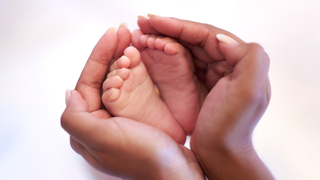Healthy eating in pregnancy
Eating a healthy, nutritious diet is especially important if you're pregnant or planning to be.
Your baby relies on you to provide the right balance of nutrients to help them grow and develop properly (even after they're born).
Which foods should I eat in pregnancy?
You don't need to spend lots of money, or go on a special diet – you just need a balance of the right types of food. These include:
Looking after your teeth
Hormonal changes during pregnancy may make your gums more vulnerable to gum disease.
You're entitled to free dental treatment during pregnancy and for a year after giving birth.
Which foods should I avoid?
There are certain foods that you should avoid while you're pregnant as they can put your baby's health at risk. These include some types of cheese and raw or undercooked meat. Have a look at which foods to avoid in pregnancy on the NHS website.
Cutting down on salt
It's a good idea to cut down on salt during pregnancy. Eating too much salt can raise your blood pressure (although high blood pressure in pregnancy can also be caused by other things). High blood pressure can increase your risk of developing heart disease or stroke.
Should I eat for 2?
No – this is a myth! Being pregnant, you'll obviously be more hungry than usual, but even if you are expecting twins or more, you don't need to eat extra portions.
In the final 3 months of your pregnancy, you'll need an extra 200 calories a day – that's the same as 2 slices of wholemeal toast and margarine.
Healthy Start vouchers
You may be entitled to Healthy Start vouchers. These can be used to buy milk, and plain, fresh and frozen fruit and vegetables in local shops. You can also get vouchers for free vitamins. Find out if you are entitled to Healthy Start vouchers.
Healthy eating tip
Try starting the day with a healthy breakfast. This should help you snack less between meals – especially on foods that are high in fat and sugar. Have a look at Tommy's 5 easy breakfast ideas in pregnancy.
More information on healthy eating in pregnancy

Baby basics
From the essentials of caring for your baby to understanding their sleep, find out all the baby basics you need to know about your newborn.
